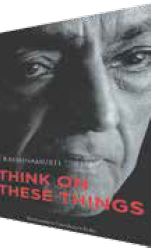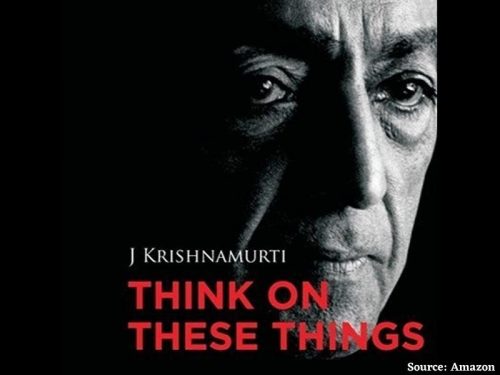Profound insights: Think on these things
 Think on these things – J. Krishnamurti; Krishnamurti Foundation; Rs.250; Pages 267
Think on these things – J. Krishnamurti; Krishnamurti Foundation; Rs.250; Pages 267
Legendary philosopher, spiritual guru, educationist and one of the world’s pioneer environmentalists Jiddu Krishnamurti (1895- 1986) travelled the world for six decades, delivering illuminating commentaries on the scriptures, philosophy and education. The wisdom he shared, much of which was compiled in the form of books,
has a timeless quality and universal reach.
Unlike many philosophers, sages and seers whose teachings are oft interred with their bones or relegated to unfrequented library spaces, Krishnamurti’s education philosophy, based on his vision of human progress, lives on in several highly respected bricks-n-mortar schools promoted by the Chennai-based Krishnamurti Foundation India
(estb.1928 as the Rishi Valley Trust and renamed KFI in 1970).
Today KFI supervises six environment-friendly, no-frills schools across the country with the pioneer Rishi Valley School, Chittoor (Andhra Pradesh) ranked India’s #1 co-ed boarding school for seven years consecutively in the annual EducationWorld India School Rankings.
“A school is a place where one learns about the totality, the wholeness of life,” said Krishnamurti famously. “Academic excellence is absolutely necessary, but a school includes much more than that. It is a place where both the teacher and the student explore, not only the outer world, the world of knowledge, but also their own thinking, their
own behaviour.”
This book is a collection of some of Krishnamurti’s musings and interactions with students, parents and teachers in India. It covers a wide canvas in which the philosopher-seer reflects on a host of issues related to the human condition — from ambition, desire and acquisitiveness to love and freedom, to intelligence, creative discontent, life and death, religion and God. As Think On These Things, the title of the book urges us — they are the core of human existence.
The merit of this compendium is that it awakens the reader to a deeper understanding of the mind of this revered seer. The content is thought provoking, profound without being pedantic, guiding gently without being preachy. Consider for instance, his thoughts on education, a subject with which he was deeply engaged. They raise provocative questions about the meaning and purpose of education. Why do children struggle to be educated? Is it merely to pass examinations for job preparation and to secure gainful employment?
Krishnamurti unambiguously expresses his dissatisfaction with conventional education. In his view, the purpose of education is to improve the mind and character of young people, to help them understand the entire process of life.
“Having a job and earning one’s livelihood is necessary, but is that all? Are we being educated only for that?” he asks. “Surely life is not merely a job, an occupation; life is something extraordinarily wide and profound, it is a great mystery, a vast realm in which we function as human beings. If we merely prepare ourselves to earn a livelihood, we shall miss the whole point of life. And to understand life is much more important than merely to prepare for examinations and become very proficient in mathematics, physics or what you will,” he says.
Much of the book’s focus is on spirituality. Krishnamurti urges us to explore beyond ancient holy texts, religious dogma and birth identity to seek true understanding of the connection between the academic and spiritual life. He stresses the importance of self-knowledge in shaping the individual, which is missing and receives scant attention in most education institutions.
“To know oneself is the very purpose of all education” he opines. “Through self-knowledge, you begin to find out what is God, what is truth, what is that state which is timeless… Self-knowledge is the beginning of wisdom. In self-knowledge is the whole universe; it embraces all the struggles of humanity,” he taught.
The reflections of this extraordinary seer are contained within the covers of this valuable gift to the public. It will inspire readers to do better and lead meaningful lives.
Anonymous
Also read: 22 Extraordinary Education Innovators
















Add comment